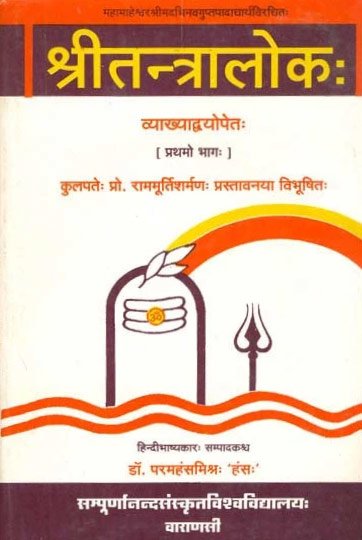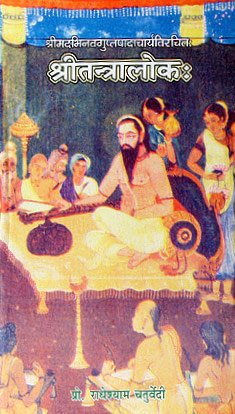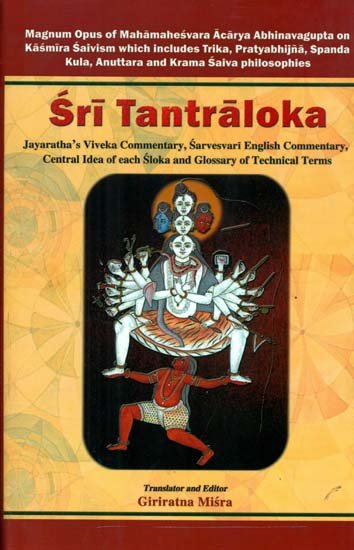Tantraloka [sanskrit text]
by Jun Takashima | 2020 | 46,255 words
The Sanskrit text of the Tantraloka of Abhinavagupta including grammatical analysis, English glossary and comparative print editions. The Tantraloka (“light on Tantra”) was written by Abhinavagupta in the 10th century in Kashmir and represents a major Encyclopedic work in Shaivism dealing with many core aspects and terminology.
Verse 1.332
भावव्रात हठाज्जनस्य हृदयान्याक्रम्य यन्नर्तयन् भङ्गीभिर्विविधाभिरात्महृदयं प्रच्छाद्य संक्रीडसे ।
यस्त्वामाह जडं जडः सहृदयंमन्यत्वदुःशिक्षितो मन्येऽमुष्य जडात्मता स्तुतिपदं त्वत्साम्यसंभावनात् ॥ ३३२ ॥
bhāvavrāta haṭhājjanasya hṛdayānyākramya yannartayan bhaṅgībhirvividhābhirātmahṛdayaṃ pracchādya saṃkrīḍase |
yastvāmāha jaḍaṃ jaḍaḥ sahṛdayaṃmanyatvaduḥśikṣito manye'muṣya jaḍātmatā stutipadaṃ tvatsāmyasaṃbhāvanāt || 332 ||
The English translation of Tantraloka Verse 1.332 is contained in the book Sri Tantraloka by Satya Prakash Singh & Swami Maheshvarananda. This book is not available online so in order to read the full text and translation you should buy the book:
Buy now! English translation by Satya Prakash Singh & Swami Maheshvarananda (2015)
Glossary of Sanskrit terms
Note: This extracts Sanskrit terms and links to English definitions from the glossary, based on an experimental segmentation of verse (1.332). Some terms could be superfluous while some might not be mentioned. Click on the word to show English definitions.
Bhava, Vrata, Hridaya, Akramya, Yat, Rita, Bhangi, Vividha, Pracchadya, Sankrida, Jada, Sahridaya, Manya, Yushmad, Shikshita, Mani, Adah, Jadatman, Tan, Stutipada, Sami, Samin, Samya, Asambhavana,
Analysis of Sanskrit grammar
Note: this is an experimental feature and only shows the first possible analysis of the Sanskrit text (Tantraloka Verse 1.332). If the system was successful in segmenting the sentence, you will see of which words it is made up of, generally consisting of Nouns, Pronouns, Verbs, Participles and Indeclinables. Click on the link to show all possible derivations of the word.
- Line 1: “bhāvavrāta haṭhājjanasya hṛdayānyākramya yannartayan bhaṅgībhirvividhābhirātmahṛdayaṃ pracchādya saṃkrīḍase ”
- bhāva -
-
bhāva (noun, masculine)[compound], [vocative single]√bhā (verb class 2)[imperative active first dual]
- vrāta -
-
vrāta (noun, masculine)[compound], [vocative single]vrāta (noun, neuter)[compound], [vocative single]
- Cannot analyse haṭhājjanasya*hṛ
- hṛdayānyā -
-
hṛdaya (noun, neuter)[nominative plural], [vocative plural], [accusative plural]
- ākramya -
-
ākramya (noun, masculine)[compound], [vocative single]ākramya (noun, neuter)[compound], [vocative single]
- yann -
-
yat (noun, masculine)[vocative single]√i -> yat (participle, masculine)[nominative single from √i class 2 verb], [vocative single from √i class 2 verb]
- ar -
-
a (noun, masculine)[compound], [vocative single]ā (noun, feminine)[nominative single]ṛ (noun, feminine)[nominative single]ṛ (noun, masculine)[nominative single]
- ṛta -
-
ṛta (indeclinable adverb)[indeclinable adverb]ṛta (noun, masculine)[compound], [vocative single]ṛta (noun, neuter)[compound], [vocative single]
- yan -
-
yat (noun, masculine)[vocative single]√i -> yat (participle, masculine)[nominative single from √i class 2 verb], [vocative single from √i class 2 verb]
- bhaṅgībhir -
-
bhaṅgī (noun, feminine)[instrumental plural]
- vividhābhir -
-
vividhā (noun, feminine)[instrumental plural]
- ātma -
-
ātman (noun, masculine)[compound]
- hṛdayam -
-
hṛdaya (noun, masculine)[adverb], [accusative single]hṛdaya (noun, neuter)[adverb], [nominative single], [accusative single]hṛdayā (noun, feminine)[adverb]
- pracchādya -
-
pracchādya (indeclinable)[indeclinable]pracchādya (noun, masculine)[compound], [vocative single]pracchādya (noun, neuter)[compound], [vocative single]
- saṅkrīḍa -
-
saṅkrīḍa (noun, masculine)[compound], [vocative single]
- se -
-
si (noun, feminine)[vocative single]sa (noun, neuter)[nominative dual], [vocative dual], [accusative dual], [locative single]√as (verb class 2)[present middle second single]
- Line 2: “yastvāmāha jaḍaṃ jaḍaḥ sahṛdayaṃmanyatvaduḥśikṣito manye'muṣya jaḍātmatā stutipadaṃ tvatsāmyasaṃbhāvanāt ”
- yastvā -
-
√yas -> yastvā (absolutive)[absolutive from √yas]
- māha -
-
√māh (verb class 1)[imperative active second single]
- jaḍam -
-
jaḍa (noun, masculine)[adverb], [accusative single]jaḍa (noun, neuter)[adverb], [nominative single], [accusative single]jaḍā (noun, feminine)[adverb]
- jaḍaḥ -
-
jaḍa (noun, masculine)[nominative single]
- sahṛdayaṃ -
-
sahṛdaya (noun, masculine)[adverb], [accusative single]sahṛdaya (noun, neuter)[adverb], [nominative single], [accusative single]sahṛdayā (noun, feminine)[adverb]
- manya -
-
manya (noun, masculine)[compound], [vocative single]manya (noun, neuter)[compound], [vocative single]√man -> manya (absolutive)[absolutive from √man]√man -> manya (absolutive)[absolutive from √man]
- tvad -
-
yuṣmad (pronoun, none)[ablative single]
- uḥ -
-
u (noun, masculine)[nominative single]ṛ (noun, feminine)[ablative single], [genitive single]ṛ (noun, masculine)[ablative single], [genitive single]
- śikṣito* -
-
śikṣita (noun, masculine)[nominative single]√śikṣ -> śikṣita (participle, masculine)[nominative single from √śikṣ class 1 verb], [nominative single from √śikṣ]√śak -> śikṣita (participle, masculine)[nominative single from √śak]
- manye' -
-
manya (noun, masculine)[locative single]manya (noun, neuter)[nominative dual], [vocative dual], [accusative dual], [locative single]manyā (noun, feminine)[nominative dual], [vocative single], [vocative dual], [accusative dual]manī (noun, masculine)[dative single]√man (verb class 4)[present middle first single], [present passive first single]√man (verb class 8)[present passive first single]
- amuṣya -
-
adaḥ (pronoun, masculine)[genitive single]adaḥ (pronoun, neuter)[genitive single]
- jaḍātma -
-
jaḍātman (noun, masculine)[compound]jaḍātman (noun, neuter)[compound], [adverb], [nominative single], [vocative single], [accusative single]
- tā -
-
tā (noun, feminine)[nominative single]tan (noun, masculine)[nominative single]
- stutipadam -
-
stutipada (noun, neuter)[adverb], [nominative single], [accusative single]
- tvat -
-
yuṣmad (pronoun, none)[ablative single]
- sāmya -
-
sāmi (indeclinable adverb)[indeclinable adverb]sāmi (indeclinable)[indeclinable]sāmin (noun, masculine)[compound], [adverb], [nominative single]sāmya (noun, neuter)[compound], [vocative single]
- asambhāvanā -
-
asambhāvanā (noun, feminine)[nominative single]
- āt -
-
āt (indeclinable particle)[indeclinable particle]a (noun, masculine)[adverb], [ablative single]
Other editions:
Also see the following editions of the Sanskrit text or (alternative) English translations of the Tantraloka Verse 1.332
Sri Tantraloka (Set of 8 Volumes)
by Paramahansa Mishra (2000)
[श्री तन्त्रालोकः (संस्कृत एवं हिंदी अनुवाद)] Sanskrit Text with Hindi Translation; Published by Sampurnanand Sanskrit University; With two commentaries: Viveka (विवेक) by Ācārya Śrī Jayaratha and Nīrakṣīraviveka (नीरक्षीरविवेक) by Paramhans Mishra.
Buy now!
Tantraloka of Abhinavagupta (with Jnanavati Hindi commentary)
by Radheshyam Chaturvedi (2002)
[आचार्य अभिनवगुप्त द्वारा रचित तंत्रलोक: संस्कृत एवम् हिन्दी अनुवाद (पाँच खंडों में)] Sanskrit Text with Hindi Translation and Commentary; Published by Chaukhambha Vidya Bhawan.
Buy now!
Sri Tantraloka of Abhinavagupta
by Giriratna Misra (2018)
With Viveka Saṃskṛta Commentary by Rājānaka Jayaratha; Sanskrit Text, Transliteration, Sarveshwari English commentary; With Glossary and Central Idea of Each Śloka; Published by Chaukhamba Surbharati Prakashan
Buy now!![Tantraloka [sanskrit text] - book cover](/uploads/a/Tantraloka-Sanskrit.jpg)


